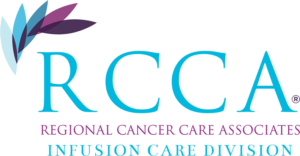Asthma
Asthma
Asthma Treatment in NJ, CT, and MD
Asthma is a chronic condition that affects the lungs. It can be mild and intermittent, or severe enough to interfere with a person’s daily activities. At Regional Cancer Care Associates, individuals with asthma can receive infusion treatments to help manage their symptoms. Serving patients throughout New Jersey, Connecticut, Maryland, and the Washington, D.C. area, Regional Cancer Care Associates offers infusion services for a range of chronic conditions.
 What Is Asthma?
What Is Asthma?
The human body reacts to potentially harmful or irritating foreign substances by triggering an immune response. In people with asthma, triggers like dust, pollen, or allergens cause the body to mount an inflammatory response. The airways swell up, become constricted, and may produce mucus. This makes it difficult for the person to breathe deeply, and he or she may cough, wheeze, or feel tightness in the chest. During an asthma attack, a person may feel like he can’t get enough air into his lungs.
According to Mayo Clinic, asthma is classified into four general categories based on the severity and frequency of asthma attacks:
- Mild intermittent asthma
- Mild persistent asthma
- Moderate persistent asthma
- Severe persistent asthma
The exact cause of asthma is unknown. However, certain environmental factors can trigger an asthma attack, such as allergens or poor air quality. In some patients, asthma is induced by physical activity.
Symptoms of Asthma
Asthma symptoms vary from patient to patient but can include:
- Coughing or wheezing attacks
- Chest pain or tightness
- Shortness of breath
- Wheezing when exhaling
- Difficulty sleeping
- Coughing fits early in the morning or during the night
These symptoms are often exacerbated when a patient is exercising or has a cold or other respiratory infection.
Risk Factors for Asthma
Risk factors for asthma may include:
- Age: Patients of all ages can develop asthma, but asthma attacks are most common in children ages five to 17 years.
- Sex: Adult females are more likely to have asthma than adult males. However, among children, asthma is more prevalent in males.
- Geography: Individuals who live in dense urban environments are at higher risk of developing asthma than those in suburban or rural settings.
- Racial or ethnic background:The risk of asthma is higher among African American and Puerto Rican patients than among people of other races or ethnicities.
- Exposure to smoke: Patients who smoke or who are exposed to secondhand smoke are at elevated risk of developing asthma.
- Family and medical history: Having a blood relative with asthma increases a person’s risk, and people who have other types of allergies may be more at risk of asthma.
According to the Centers for Disease Control and Prevention (CDC), asthma affects more than 25 million Americans.
Diagnosis and Treatment of Asthma
If a person has symptoms of asthma, her doctor typically will perform a physical exam to rule out other conditions that could cause similar symptoms, such as a respiratory infection. The doctor may also perform tests to measure the person’s lung function or identify asthma triggers. These assessments may include:
- Peak flow monitoring: This test measures how quickly and forcefully a patient can blow air out of her lungs.
- Spirometry: This test can measure how much air a patient can exhale and can indicate whether the bronchial tubes are narrowed.
- Sputum eosinophils: This lab test checks for white blood cells in the saliva and the mucus that a patient coughs up. The presence of a particular type of white blood cell, known as eosinophils, indicates that the airways are inflamed.
- Provocative testing: If a patient has symptoms of exercise or cold-induced asthma, the doctor may measure lung function after inducing a reaction, such as having the patient perform vigorous exercise.
- Methacholine challenge test: Methacholine is a drug that causes the airways to narrow slightly. Patients with asthma will typically react to a methacholine trigger.
- Allergy testing: An allergy skin prick test or blood test can help identify potential triggers, such as pet dander or pollen.
Patients may also need imaging tests, such as a chest X-ray, to look for underlying conditions that may cause breathing problems.
Asthma can’t be prevented, but people can take steps to reduce the frequency and severity of their asthma attacks. Their primary care provider, immunologist, or pulmonologist will help them develop an action plan for managing their asthma. This plan may include:
- Staying up to date on vaccinations: Infections like influenza can worsen asthma flare-ups, so patients should stay current on all recommended vaccinations.
- Avoiding asthma triggers: Once patients know what triggers their asthma flare-ups, such as air pollution, mold spores, or pollen, they can take steps to avoid these irritants.
- Monitor airflow: Some patients keep a peak flow meter at home to measure their lung function regularly.
- Medication: Most individuals use quick-relief medicines, delivered via an inhaler, to manage asthma attacks. Some patients with asthma also take daily medications to reduce inflammation and help keep their airways open. Other patients may get regular allergy shots to reduce their body’s reaction to allergens.
The right combination of medications is different for each patient and depends on the person’s specific asthma triggers, symptoms, and other underlying health conditions.
Infusion Therapy for Asthma
Inhaled and oral medications may not be always the best fit – or only treatment needed — for every individual. Some patients benefit from infusion therapy, which delivers medication intravenously into the bloodstream, usually through a vein in the patient’s arm. Intravenous (IV) drug treatments for asthma can help reduce the body’s inflammatory reaction to asthma irritants.
Patients who receive infusion therapy are referred by their healthcare provider, who prescribes the medication. Infusion treatment can be administered at a hospital, community care center, or in a patient’s home. More and more, health care providers are recommending that patients with chronic conditions receive their infusion treatments at an outpatient, community-based care center like Regional Cancer Care Associates.
The medical team at Regional Cancer Care Associates administers infusions – including biological and immunotherapy treatments – for a host of non-cancerous conditions, in addition to providing cancer care infusion services. Patients can receive infusion treatments for conditions including:
- Crohn’s disease
- Emphysema
- Iron deficiency anemia
- Multiple sclerosis
- Lupus
- Osteoporosis
- Plaque psoriasis
- Rheumatoid arthritis
- Ulcerative colitis
Regional Cancer Care Associates is committed to helping each patient achieve the best possible health outcomes. The medical team works with patients and their physicians to deliver the infusion therapy the referring physician has prescribed. The physicians and nurses at Regional Cancer Care Associates place a strong emphasis on patient education, making sure each individual fully understands his or her condition, treatment plan, possible side effects, and the cost of treatment.
Receive Infusion Treatment for Asthma in NJ, CT, and MD
Because asthma is a chronic condition, it can keep people from engaging in the activities they love. A comprehensive treatment plan, often including infused medications, is the key to managing asthma symptoms and improving quality of life. At Regional Cancer Care Associates, patients can receive effective treatment close to home at one of the many RCCA locations in New Jersey, Connecticut, Maryland, and the Washington, D.C. area. To learn more or schedule an appointment, contact Regional Cancer Care Associates today.
CONVENIENT LOCATIONS IN NEW JERSEY, CONNECTICUT, MARYLAND, AND THE WASHINGTON, DC AREA
For more information, or to schedule an appointment, call (844) 474-6866. You can also schedule an appointment by calling the RCCA location nearest you.

 What Is Asthma?
What Is Asthma?